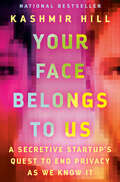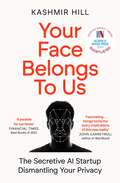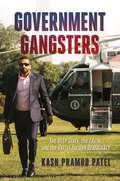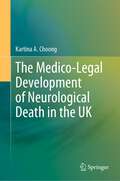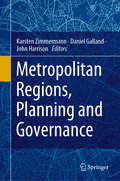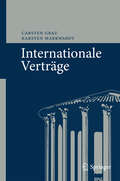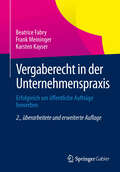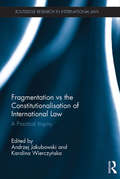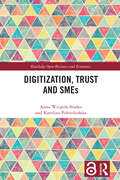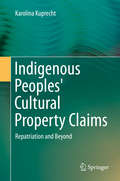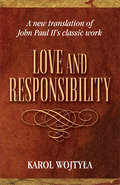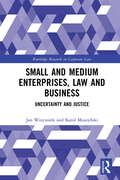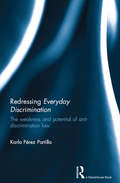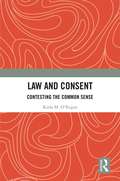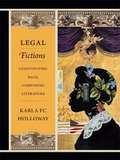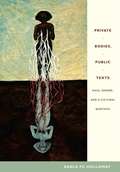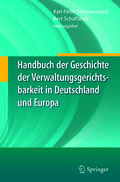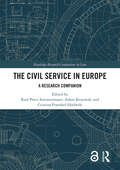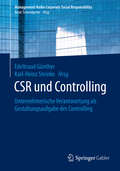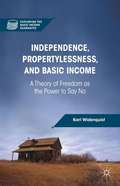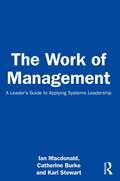- Table View
- List View
Your Face Belongs to Us: A Secretive Startup's Quest to End Privacy as We Know It
by Kashmir HillThe story of a small AI company that gave facial recognition to law enforcement, billionaires, and businesses, threatening to end privacy as we know it&“The dystopian future portrayed in some science-fiction movies is already upon us. Kashmir Hill&’s fascinating book brings home the scary implications of this new reality.&”—John Carreyrou, author of Bad BloodLonglisted for the Financial Times and Schroders Business Book of the Year AwardNew York Times tech reporter Kashmir Hill was skeptical when she got a tip about a mysterious app called Clearview AI that claimed it could, with 99 percent accuracy, identify anyone based on just one snapshot of their face. The app could supposedly scan a face and, in just seconds, surface every detail of a person&’s online life: their name, social media profiles, friends and family members, home address, and photos that they might not have even known existed. If it was everything it claimed to be, it would be the ultimate surveillance tool, and it would open the door to everything from stalking to totalitarian state control. Could it be true?In this riveting account, Hill tracks the improbable rise of Clearview AI, helmed by Hoan Ton-That, an Australian computer engineer, and Richard Schwartz, a former Rudy Giuliani advisor, and its astounding collection of billions of faces from the internet. The company was boosted by a cast of controversial characters, including conservative provocateur Charles C. Johnson and billionaire Donald Trump backer Peter Thiel—who all seemed eager to release this society-altering technology on the public. Google and Facebook decided that a tool to identify strangers was too radical to release, but Clearview forged ahead, sharing the app with private investors, pitching it to businesses, and offering it to thousands of law enforcement agencies around the world. Facial recognition technology has been quietly growing more powerful for decades. This technology has already been used in wrongful arrests in the United States. Unregulated, it could expand the reach of policing, as it has in China and Russia, to a terrifying, dystopian level. Your Face Belongs to Us is a gripping true story about the rise of a technological superpower and an urgent warning that, in the absence of vigilance and government regulation, Clearview AI is one of many new technologies that challenge what Supreme Court Justice Louis Brandeis once called &“the right to be let alone.&”
Your Face Belongs to Us: The Secretive Startup Dismantling Your Privacy
by Kashmir HillLONGLISTED FOR THE FINANCIAL TIMES BUSINESS BOOK OF THE YEAR AWARD&‘The dystopian future portrayed in some science-fiction movies is already upon us. Kashmir Hill&’s fascinating book brings home the scary implications of this new reality&’ JOHN CARREYROU, author of Bad Blood&‘A gripping account' NEW STATESMAN ______________________________________________________________________ When Kashmir Hill stumbled upon Clearview AI, a mysterious startup selling an app that claimed it could identify anyone using just a snapshot of their face, the implications were terrifying. The app could use the photo to find your name, your social media profiles, your friends and family – even your home address. But this was just the start of a story more shocking than she could have imagined. Launched by computer engineer Hoan Ton-That and politician Richard Schwartz, and assisted by a cast of controversial characters on the alt-right, Clearview AI would quickly rise to the top, sharing its app with billionaires and law enforcement. In this riveting feat of reporting Hill weaves the story of Clearview AI with an exploration of how facial recognition technology is reshaping our lives, from its use by governments and companies like Google and Facebook (who decided it was too radical to release) to the consequences of racial and gender biases baked into the AI. Soon it could expand the reach of policing — as it has in China and Russia — and lead us into a dystopian future.Your Face Belongs to Us is a gripping true story. It illuminates our tortured relationship with technology, the way it entertains us even as it exploits us, and it presents a powerful warning that in the absence of regulation, this technology will spell the end of our anonymity. ______________________________________________________________________'I loved this. A dark and gripping story, meticulously researched and stylishly told' JENNY KLEEMAN, author of Sex Robots & Vegan Meat
Government Gangsters: The Deep State, the Truth, and the Battle for Our Democracy
by Kash Pramod Patel&“A brilliant roadmap highlighting every corrupt actor, to ultimately return our agencies and departments to work for the American People…we will use this blueprint to help us take back the White House and remove these Gangsters from all of Government!&” —Donald J. Trump The highest levels of government have been infiltrated by an anti-democratic Deep State that can be defeated by refocusing our national security mission and relentlessly defending the truth.A sinister cabal of corrupt law enforcement personnel, intelligence agents, and military officials at the highest levels of government plotted to overthrow a president. Even after they failed, they continue to secretly pull the levers of power without any accountability to the American people. This isn&’t the synopsis of a fictional spy thriller. This is what is actually happening in the United States government. In Government Gangsters, Kash Patel—a former top official in the White House, the Department of Defense, the Intelligence Community, and the Department of Justice—pulls back the curtain on the Deep State, revealing the major players and tactics within the permanent government bureaucracy, which has spent decades stripping power away from the American people and their elected leaders. Based on his firsthand knowledge, Patel reveals how we can defeat the Deep State, reassert self-government, and restore our democracy.
The Medico-Legal Development of Neurological Death in the UK
by Kartina A. ChoongDiagnosis of death by neurological criteria (DNC) is a construct which has been part of the British medico-legal landscape for nearly half a century. This book examines the factors behind its emergence, and discusses the various changes that took place in the last few decades that culminated in the current definition and clinical criteria for determining brain-based death. It highlights the continuities and discontinuities in practice, and the impact they have on the issue of withdrawal of mechanical ventilation in intensive care units and on the field of organ transplantation. The book also explores the law’s response to the introduction and development of DNC in clinical practice. It demonstrates how the legitimacy of the definition and criteria used by the medical profession were forged in the courtroom rather than in Parliament. It documents why case law were introduced in court, and assesses whether organ donation was a consideration in the deliberations. It will be emphasised that courts have given insufficient consideration to requests made in recent cases to consider a broader range of methods to determine death. Those pleas were made on the grounds that the definition and criteria used in the UK are dissimilar to those used in other jurisdictions that also adopt DNC; and that faith communities have a different understanding of death. By taking a close look at those other approaches before highlighting the inherent limitations of the courtroom as the forum that confers DNC its legitimacy, the book puts forward the argument that the democratic process should be engaged.
Metropolitan Regions, Planning and Governance
by John Harrison Karsten Zimmermann Daniel GallandThe aim of this book is to investigate contemporary processes of metropolitan change and approaches to planning and governing metropolitan regions. To do so, it focuses on four central tenets of metropolitan change in terms of planning and governance: institutional approaches, policy mobilities, spatial imaginaries, and planning styles. The book’s main contribution lies in providing readers with a new conceptual and analytical framework for researching contemporary dynamics in metropolitan regions. It will chiefly benefit researchers and students in planning, urban studies, policy and governance studies, especially those interested in metropolitan regions.The relentless pace of urban change in globalization poses fundamental questions about how to best plan and govern 21st-century metropolitan regions. The problem for metropolitan regions—especially for those with policy and decision-making responsibilities—is a growing recognition that these spaces are typically reliant on inadequate urban-economic infrastructure and fragmented planning and governance arrangements. Moreover, as the demand for more ‘appropriate’—i.e., more flexible, networked and smart—forms of planning and governance increases, new expressions of territorial cooperation and conflict are emerging around issues and agendas of (de-)growth, infrastructure expansion, and the collective provision of services.
Internationale Verträge
by Carsten Grau Karsten MarkwardtDas vorliegende Buch liefert in neun übersichtlichen Kapiteln einen kompakten Einstieg in den Bereich "Internationale Verträge" für jeden damit beschäftigten Praktiker. Es beantwortet die wichtigsten Fragen und schärft das Problembewusstsein für die Abfassung und Prüfung künftiger Verträge. Es beinhaltet neben zahlreichen Fallbeispielen, die vorwiegend der ober- und höchstgerichtlichen Rechtsprechung entnommen sind, Vorschläge zur Vertragsgestaltung, Vertragsdurchführung, Konfliktbewältigung, Durchsetzung von Ansprüchen im Ausland sowie Checklisten - von Praktikern für Praktiker.
Vergaberecht in der Unternehmenspraxis
by Karsten Kayser Frank Meininger Beatrice FabryIn Deutschland erteilen öffentliche Auftraggeber jedes Jahr mehr als eine Million Aufträge über Bau-, Dienst- und Lieferleistungen in einer Gesamthöhe von rund 250 Milliarden Euro. Die erfahrenen Rechtsanwälte und Partner der Kanzlei Menold Bezler führen Unternehmen in die Grundlagen des Vergaberechts sowie das Vergabeverfahren von Angebotsphase über Angebotsprüfung bis hin zur Zuschlagserteilung ein.
Fragmentation vs the Constitutionalisation of International Law: A Practical Inquiry (Routledge Research in International Law)
by Andrzej Jakubowski Karolina WierczyńskaThe current system of international law is experiencing profound transformations. Indeed, the simultaneous processes of globalization combined with the disintegration of international systems of governance and law-making pose complex challenges for legal scholarship. The doctrinal response to these challenges has been theorized within two seemingly contradictory discourses in international law: fragmentation and constitutionalisation. This book takes an innovative approach to international law, viewing the processes of the fragmentation and constitutionalisation as being profoundly interconnected and reflective of each other. It brings together a select group of contributors, including both established and emerging scholars and practitioners, in order to explore the ways in which the problems of fragmentation and constitutionalisation are viscerally linked one to the other and thus mutually conditioning and stimulating. The book considers the theory and practice of international law looking at the two phenomena in relation to the various fields of international law such as international criminal law, cultural heritage law and international environmental law.
Digitization, Trust and SMEs (Routledge Open Business and Economics)
by Anna Wziątek-Staśko Karolina PobiedzińskaThis book exposes two inspiring research categories: digitization and trust. Digitization is a phenomenon that dynamically modifies the modern world in almost every area. Modern technologies, artificial intelligence and humanoid robots are instruments with an increasingly significant impact on the shape of the management process of modern organizations, including the way people are managed. Trust is a subtle concept, with a very different interpretation, influencing the behaviour of employees in a multifaceted way. A superficial look at the combination of both categories seems to see them as irrational. Upon closer examination, however, it exposes many interesting fields of scientific exploration. Trust, as a research category, has been included in three significant dimensions: in relation to co-workers, superiors and information technology, dominated by digitization. Each draws attention to different problems of priority importance for the organization. Asserting the idea that trust in the conditions of digitization becomes a category of timeless importance in the interdisciplinary dimension, this volume will be of interest to researchers, academics, practitioners and advanced students in the fields of management of technology and innovation, organizational studies and leadership.The Open Access version of this book, available at www.taylorfrancis.com, has been made available under a Creative Commons Attribution-Non Commercial-No Derivatives (CC-BY-NC-ND) 4.0 license.
Indigenous Peoples' Cultural Property Claims
by Karolina KuprechtThis book analyses the legal aspects of international claims by indigenous peoples for the repatriation of their cultural property, and explores what legal norms and normative orders would be appropriate for resolving these claims. To establish context, the book first provides insights into the exceptional legislative responses to the cultural property claims of Native American tribes in the United States and looks at the possible relevance of this national law on the international level. It then shifts to the multinational setting by using the method of legal pluralism and takes into consideration international human rights law, international cultural heritage law, the applicable national laws in the United Kingdom, France and Switzerland, transnational law such as museum codes, and decision-making in extra-legal procedures. In the process, the book reveals the limits of the law in dealing with the growing imperative of human rights in the field, and concludes with three basic insights that are of key relevance for improving the law and decision-making with regard to indigenous peoples' cultural property.
Love and Responsibility
by Karol Woktyla Grzegorz IgnatikIn this classic work, readers are given a window into the authentic meaning of human love as Karol Wojtyla explains relationships between persons, especially concerning sexual ethics. Translator Grzegorz Ignatik, a native Polish speaker, provides helpful notes and defines key terms.<P><P> Please note: This book came from the publisher with missing characters. Any character with a diacritical mark has been replaced by a blank space.
Small and Medium Enterprises, Law and Business: Uncertainty and Justice (Routledge Research in Corporate Law)
by Jan Winczorek Karol MuszynskiThe law plays an ambiguous role in running business. While legal tools can be used to tame uncertainties, for example, by concluding contracts to safeguard enforcement of future claims, they can also generate uncertainty. These secondary uncertainties like ones stemming from vague rights and obligations may be counterbalanced by using different resources and strategies, including acting informally, modifying business plans or accepting the losses from unpaid dues. This book discusses how small and medium enterprises use the law, abstain from using the law, and use alternative pathways to manage business uncertainties. Examining these topics through the lenses of an extensive qualitative and quantitative empirical study on justiciable issues, access to justice and legal uncertainty among SMEs in Poland, it implements and expands upon the paradigmatic paths to justice methodology which has been successfully used to study conflict resolution, access to justice and utilisation of the law by individuals in more than 30 jurisdictions. It argues that the grand promise of modern law - that it is a certainty-providing, neutral and democratic device to resolve problems and conflicts - is not fully delivered. It reveals how the conditions of a freshly developed capitalism combined with the rule of law backsliding contribute to universal, structural problems with access to justice meaning that accessing justice is a resource-hungry process, which incentivises small businesses to settle for their legal problems and engage in informal and alternative strategies.
Professional Practice in Child Protection and the Child’s Right to Participate (The Focus On Series)
by Asgeir Falch-Eriksen Karmen TorosThis book explains and discusses how a child’s right to freedom of expression is upheld through practice and decision-making in Child Protection Services (CPS). Using the right to expression as stipulated in Article 12.2 of the United Nations Convention on the Rights of the Child (CRC) as a point of departure, it explains what CPS practices should look like and how they must operate to uphold and enforce the rights of the child by providing "the opportunity to be heard" in any administrative practice. Current research literature documents extensively, and across countries, how either the voice of the child is not heard or, alternatively, the existence of a pro forma/tokenistic approach to listening to the child throughout CPS practices. Taking a three-fold approach, this book establishes a clearer connection between rights and professional practice according to Article 12 extrapolates how rights-based practice is achieved during CPS practices provides a comprehensive answer to the challenge of implementing Article 12.2 through policy and legislation. It will be of interest to all students, academic and professionals working within child protection including social workers, probation officers, health and social care workers, lawyers and teachers.
Die beforschte Polizei: Entwicklung und Stand der Polizeiforschung in Deutschland (Forum für Verwaltungs‐ und Polizeiwissenschaft)
by Karlhans LieblDieses Buch zeigt auf, zwischen welchen gesellschaftlichen Polen oder Widersprüchen die Polizeiforschung bis heute steht. Dies ist umso bedauerlicher, da eine (kritische) Polizeiforschung zum gegenwärtigen Zeitpunkt, mit allen Verwerfungen in den demokratischen Systemen, der Rücknahme demokratischer Rechte und den vielfältigen Krisen, notwendiger denn je wäre. Dieser Band stellt die Entwicklung und die Ergebnisse der Forschungen für, über und von der Polizei in den letzten 50 Jahren dar und hinterfragt diese kritisch. Er richtet sich somit an Forschende und Praktiker*innen gleichermaßen.
Korruption in Deutschland: Ein Überblick über den Stand der Korruptionsforschung seit 1945 (Forum für Verwaltungs‐ und Polizeiwissenschaft)
by Karlhans LieblDas Buch führt die wichtigsten Strömungen der Korruptionsforschung seit 1945 auf. Ein besonderes Augenmerk wird dabei auf die deutsche Forschungslandschaft gelegt. Weitere Schwerpunkte sind die Untersuchungen zum Umfang der Korruption, methdoische Probleme der Erhebung von Daten zur Korruption und Präventionsvorschläge. Letzterer Gesichtspunkt hat wieder einen besonderen Blick auf Deutschland. Abschließend werden die bisherigen Forschungen bewertet und Forderungen für zukünftige Untersuchungen dargelegt.
Redressing Everyday Discrimination: The Weakness and Potential of Anti-Discrimination Law
by Karla PortillaThis book examines the harm that everyday discrimination can cause and proposes ways in which it can be redressed. Extreme forms of harmful expression, such as incitement to hatred, have been significantly addressed in law. Everyday generalised prejudice, negative stereotypes and gross under-representation of disadvantaged groups in mainstream media are, however, widely perceived as ‘normal’, and their criticism is regularly trivialised. In response, this book draws on critical and feminist theory in order to forge a theoretical analysis of the harm created through everyday discrimination. Arguing that anti-discrimination law can and should be extended as a tool to offer protection against the harm inflicted, the book goes on to consider both its limits, and possibilities, for redressing this discriminatory practice.
Law and Consent: Contesting the Common Sense
by Karla M. O'ReganConsent is used in many different social and legal contexts with the pervasive understanding that it is, and has always been, about autonomy – but has it? Beginning with an overview of consent’s role in law today, this book investigates the doctrine’s inseparable association with personal autonomy and its effect in producing both idealised and demonised forms of personhood and agency. This prompts a search for alternative understandings of consent. Through an exploration of sexual offences in Antiquity, medical practice in the Middle Ages, and the regulation of bodily harm on the present-day sports field, this book demonstrates that, in contrast to its common sense story of autonomy, consent more often operates as an act of submission than as a form of personal freedom or agency. The book explores the implications of this counter-narrative for the law’s contemporary uses of consent, arguing that the kind of freedom consent is meant to enact might be foreclosed by the very frame in which we think about autonomy itself. This book will be of interest to scholars of many aspects of law, history, and feminism as well as students of criminal law, bioethics, and political theory.
Arabs at Home and in the World: Human Rights, Gender Politics, and Identity (Routledge Research in Human Rights Law)
by Karla M. McKandersThis volume brings together an interdisciplinary group of scholars from the United States, the Middle East, and North Africa, to discuss and critically analyze the intersection of gender and human rights laws as applied to individuals of Arab descent. It seeks to raise consciousness at the intersection of gender, identity, and human rights as it relates to Arabs at home and throughout the diaspora. The context of revolution and the destabilizing impact of armed conflicts in the region are used to critique and examine the utility of human rights law to address contemporary human rights issues through extralegal strategies. To this end, the volume seeks to inform, educate, persuade, and facilitate newer or less-heard perspectives related to gender and masculinities theories. It provides readers with new ways of understanding gender and human rights and proposes forward-looking solutions to implementing human rights norms. The goal of this book is to use the context of Arabs at home and throughout the diaspora to critique and examine the utility of human rights norms and laws to diminish human suffering with the goal of transforming the structural, social, and cultural conditions that impede access to human rights. This book will be of interest to a diverse audience of scholars, students, public policy researchers, lawyers and the educated public interested in the fields of human rights law, international studies, gender politics, migration and diaspora, and Middle East and North African politics.
Legal Fictions: Constituting Race, Composing Literature
by Karla Fc HollowayIn Legal Fictions, Karla FC Holloway both argues that U.S. racial identity is the creation of U.S. law and demonstrates how black authors of literary fiction have engaged with the law's constructions of race since the era of slavery. Exploring the resonance between U.S. literature and U.S. jurisprudence, Holloway reveals Toni Morrison's Beloved and Charles Johnson's Middle Passage as stories about personhood and property, David Bradley's The Chaneysville Incident and Ralph Ellison's Invisible Man as structured by evidence law, and Nella Larsen's Passing as intimately related to contract law. Holloway engages the intentional, contradictory, and capricious constructions of race embedded in the law with the same energy that she brings to her masterful interpretations of fiction by U.S. writers. Her readings shed new light on the many ways that black U.S. authors have reframed fundamental questions about racial identity, personhood, and the law from the nineteenth into the twenty-first centuries. Legal Fictions is a bold declaration that the black body is thoroughly bound by law and an unflinching look at the implications of that claim.
Private Bodies, Public Texts: Race, Gender, and a Cultural Bioethics
by Karla Fc HollowayIn Private Bodies, Public Texts, Karla FC Holloway examines instances where medical issues and information that would usually be seen as intimate, private matters are forced into the public sphere. As she demonstrates, the resulting social dramas often play out on the bodies of women and African Americans. Holloway discusses the spectacle of the Terri Schiavo right-to-die case and the injustice of medical researchers' use of Henrietta Lacks's cell line without her or her family's knowledge or permission. She offers a provocative reading of the Tuskegee syphilis study and a haunting account of the ethical dilemmas that confronted physicians, patients, and families when a hospital became a space for dying rather than healing during Hurricane Katrina; even at that dire moment, race mattered. Private Bodies, Public Texts is a compelling call for a cultural bioethics that attends to the historical and social factors that render some populations more vulnerable than others in medical and legal contexts. Holloway proposes literature as a conceptual anchor for discussions of race, gender, bioethics, and the right to privacy. Literary narratives can accommodate thick description, multiple subjectivities, contradiction, and complexity.
Handbuch der Geschichte der Verwaltungsgerichtsbarkeit in Deutschland und Europa
by Karl-Peter Sommermann Bert SchaffarzikDas Handbuch zeichnet die Entwicklung des gerichtlichen Verwaltungsrechtsschutzes vom 19. Jahrhundert bis zur Gegenwart vor dem jeweiligen politischen, sozialen und rechtskulturellen Hintergrund nach, deutet sie und ordnet sie im europäischen Vergleich ein. Zugleich werden den Lesern die maßgeblichen Primärquellen zugänglich gemacht. Dazu wird die historische Entwicklung der Verwaltungsgerichtsbarkeit in Deutschland und Europa in Länderberichten nachgezeichnet; Querschnittsanalysen sowie Beiträge zum Rechtsschutz auf europäischer und internationaler Ebene eröffnen eine übergreifende Perspektive.Erstmals analysiert das Handbuch dabei systematisch alle in Deutschland eingeführten Systeme der Verwaltungsgerichtsbarkeit, von Baden (1864) bis Bremen (1924). Vorangestellt sind Beiträge zu den Formen der Verwaltungskontrolle auf Reichsebene einschließlich ihrer Ursprünge sowie die Vorgeschichte in den Ländern.Auch die Besatzungszeit und die Zusammenführung der verschiedenen Traditionen in der Verwaltungsgerichtsordnung werden einschließlich der nachfolgenden Reformetappen ausführlich behandelt. Die Entwicklung des Verwaltungsrechtsschutzes in anderen europäischen Staaten wird bis hin zur Gegenwart ebenfalls in Einzeldarstellungen präsentiert und durch Vergleichs- und Querschnittsanalysen eingeordnet. Über den Titel des Handbuchs hinaus wird der Blick auf ausgewählte, mit Europa in engem Rezeptionszusammenhang stehende Systeme des Verwaltungsrechtsschutzes erweitert. Der praktische Nutzen des Handbuchs wird dadurch erhöht, dass Originalquellen über die Errichtung, die Zuständigkeiten und das Verfahren der Verwaltungsgerichte abgedruckt sind. Das mit Unterstützung des Bundesministeriums der Justiz edierte Werk, mit dem mehrere Länder erstmals eine Geschichtsschreibung ihrer Verwaltungsgerichtsbarkeit erhalten, vereint fachlich ausgewiesene Autoren aus Wissenschaft und Praxis.
The Civil Service in Europe: A Research Companion (Routledge Research Companions in Law)
by Karl-Peter Sommermann Cristina Fraenkel-Haeberle Adam KrzywońThis book opens an often nationally focused field of research to a transnational, common European debate. It addresses the ongoing transformation of the civil service, examining its evolving landscape across Europe and exploring the intricate web of historical, social, and political influences that are shaping its current state and setting the future direction. Written by experts from different European countries, this book offers a transnational and interdisciplinary perspective on the civil service by combining legal analysis with insights from public management, political science, and sociology. It addresses the growing complexity of public administration tasks and the increasing requirements related to the qualification of civil servants, amidst global challenges such as climate change, migration, and technological progress. The book is structured to provide both a broad overview as well as in-depth analyses. It covers national developments, presents comparative studies, and tackles intersecting issues such as employment systems, non-discrimination and human rights, digitalisation, artificial intelligence, the fight against corruption, and administrative culture. It aims to identify common European standards and provide practical guidance for public service reforms. The volume will prove to be an indispensable resource for academics, practitioners, and policymakers concerned with public administration and governance.The Open Access version of this book, available at http://www.taylorfrancis.com, has been made available under a Creative Commons Attribution-Non Commercial-No Derivatives (CC-BY-NC-ND) 4.0 license.
CSR und Controlling: Unternehmerische Verantwortung als Gestaltungsaufgabe des Controlling (Management-Reihe Corporate Social Responsibility)
by Edeltraud Günther Karl-Heinz SteinkeDieses Buch gibt einen Überblick über Konzepte an der Nahtstelle von Controlling und CSR und stellt Praxisbeispiele zu einzelnen Aspekten der Steuerung einer Nachhaltigen Unternehmensführung vor. Durch die Wahl der unternehmerischen Controllinginstrumente tragen Controller zur Nachhaltigkeit der Unternehmensführung bei. Einen direkten Beitrag leisten sie durch die Entwicklung und Anwendung expliziter Konzepte des Green Controlling oder des Sustainability Management Control. Indirekt erfolgt die Wirkung, wenn das Controlling implizit über nachhaltigkeitsrelevante Aspekte, wie den Planungshorizont, Kostenarten, -stellen und -träger, Einnahmen und Ausgaben, aber auch die Wahl der Leistungsindikatoren entscheidet. Ein wertvolles Buch für Controller, die über den Tellerrand blicken. .
Independence, Propertylessness, And Basic Income
by Karl WiderquistIndependence, Propertylessness, and Basic Income argues that philosophers have focused too much on scalar freedom and proposes a theory of status freedom as effective control self-ownership: the power to have or refuse active cooperation with other willing people, or simply: freedom as the power to say no.
The Work of Management: A Leader’s Guide to Applying Systems Leadership
by Ian Macdonald Catherine Burke Karl StewartThe Work of Management demonstrates how the concepts, models and tools of Systems Leadership can be applied, enabling you to become a more effective manager by improving your own work to create a more positive and effective organisation.Positive organisations, where people come together to achieve a productive and personally satisfying purpose, and which provide the basis for a good society, do not occur by chance. They are created by the work of leaders and members who are dependent upon the way the organisation is designed and operates – its structure and systems. While the theory is explained, this book primarily presents the practical aspects – the specific values, methods and tools – that can be used to improve work and the work performance of direct reports. Building on the bestselling book Systems Leadership, this book provides leaders with a manual for the application of concepts as well as an introduction to Systems Leadership Theory, a method that has been used successfully by businesses from large multinational firms and banks, to SMEs, public agencies and NGOs. It provides a predictive capability, allowing a leader to predict what will work well and what is likely to fail, according to the context. It gives the benefit of foresight as decisions must be made.Designed as a leader’s manual for the application of the concepts around Systems Leadership, this book is for people who want to improve their own, and their organisation’s, work practices and performance.
